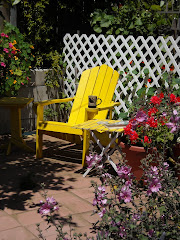Calhoun’s Can(n)ons, The Bay News, Tolusa Press, SLO, for May 8, 08
Dear Sir! Letters, Part Duh
Ah, April. Cruel. Crueler. Cruelest. At least it was for a few folks who were not selected to be part of the Tribune’s “Poetry Month” offerings. And Crueler yet, when Ms. Dian Sousa, our SLO Poet Laureate (San Luis Obispo has a poet Laureate? Who knew?) noted that she was “somewhat disappointed with the overall quality of this year’s submissions.” Letters of High Dudgeon appeared in the April 25th edition, letters both sad, funny, and highly instructional.
Reading those Cri du Coeur missives, it was clear to me that the writers were likely the victims of a Creative Writing Class taught by a proponent of the Self Esteem Movement. You recall that Edu-philosophy that swept through a whole generation of school children, teaching them that no matter what they did, it was all WONDERFUL simply because THEY were wonderful? That expressing themselves was all that was important, and judging their work by some objective standard was too demeaning and, well, too “judgmental.” And besides, an objective critique might wound one’s delicate sense of self-esteem.
So, instead of standards, a whole generation of kids grew up thinking that whatever they put their hand to, no matter how mediocre, would automatically get them a gold star and much praise – bad artwork, bad writing, bad term papers, bad poetry – it was all WONDERFUL! Thus, the intention of the writer – how he or she felt about the subject – became the all important thing: My work is wonderful because it means so much to me and should only be judged by the depth of my sincerity.
And thus some members of the Esteem Generation (or victims of a sadly misinformed Creative Writing teacher) ran smack dab into tough cookie Poet Laureate Sousa, whose response to their letters was to pour, not soothing treacle on their wounds, but gasoline and a match by noting that she will henceforth “tape their efforts to my refrigerator next to my little niece’s drawing of a pancake.”
But the letters did illustrate the bigger problem. The gist of their arguments can be summarized by the headings: “Laureate’s words hurtful,” “Poetry is personal,” and so forth. One wounded writer observed that Ms. Sousa, as the SLO Laureate, was also “SLO in understanding the meaning of respect, SLO in understanding the courage it takes to pour your feelings out and subject them to critiquing and really SLO in understanding the concept of creativity.” And another writer found “beyond understanding,” Ms. Sousa’s admonishment that budding poets, if they wish to improve, should “read and read and read.” (Uh, yes, indeed they should. I’d have the same advice for a budding painter: Look, Look, Look.)
What went missing from those letters (and likely from the creative writing classes that preceded them) is the hard fact that when it comes to “Art,” there remains an enormous chasm that separates the personal from the public, the amateur from the professional, and when it comes to separating good art from bad art, the gap remains lethally high: You deliver or you don’t. Sincerity has nothing to do with it.
And poetry is not simply good prose broken up in odd ways to look creative on the page. If great prose is like the finest wine, then great poetry is like brandywine, a distillation of words that concentrates meanings into an implosively dense brew of such lethal proofing that the results can blow the top of your head off. It’s a potent art form, one that’s risky when left in the hands of amateurs.
But most importantly, poetry is not simply an adjunct to psychotherapy. While confessional poetry may be good for the confessor’s soul, the true poet’s job isn’t to simply express his deepest feelings; it’s to use his genius and the absolute mastery of his craft to make the Reader feel what the Poet wants him to feel. The former is easy and results in bad poetry. The latter takes the inner to the outer, the personal to the Universal, and is harder to do than anyone can imagine, which is why being a good poet is such a dangerous profession – don’t try it at home. Euterpe and Calliope are harsh mistresses. I would not wish their holy demands on anyone, not even offended budding poets or SLOTown Laureates. They all have my deepest sympathy.
Subscribe to:
Post Comments (Atom)












No comments:
Post a Comment